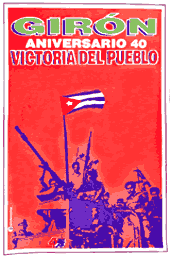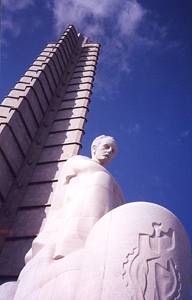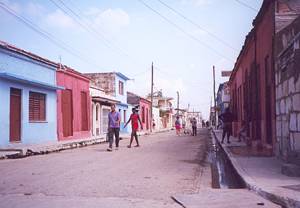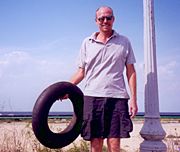


My Dinner with Élián Gonzalez
"If we were in a situation where the handcuffs were coming out of the cop's belt, I'd definitely stop what I was saying. You know that."
This didn't necessarily give me comfort at the moment. We were in the air above the mythical Caribbean island of Cuba and Moose was trying to remind me that we had never been arrested together. Why would this be the first time? I agreed that, yes, the only place I'd ever been arrested was in my own country, but that I'd just seen a movie about Cuba with a few prison scenes of a transvestite Johnny Depp transporting pages from a forbidden novel in his butt, and who knows what's down there anyway? I'd felt the need to tell my parents I was going to the place that had made them first hate the Kennedy administration only the day before my departure, simply because my father's name is on my passport (in case of emergency notify). No surprise is the best way to handle any trouble. As if to say, don't be surprised if someone's calling from the US Interest Section in Havana saying not something like: "your son has been detained by the Cuban authorities for meddling in internal affairs," but something more like: "your son has been injured trying to get into our fortress-like building here claiming it is his right as a US citizen to visit sovereign US territory on enemy soil. We have thrown him back out into the street on his ass. We'll call again when we've detained him at Immigration upon reentry into the US. Just to let you know. Thank you."
Moose and I had come from Cancun, escaping the hoards of drunken, semi-nude spring breakers to get some perspective on the ubiquitous American façade there. Besides, it seemed a few apologies were in order. It would be mere coincidence that our arrival should coincide with a somewhat more official delegation from the US who had come to take stock of the changes wrought in the forty years since the Bay of Pigs fiasco (what the Cubans call the triumph over imperialist aggression at Playa Giron), and perhaps offer a bit of semi-official contrition to the survivors of what most would call a covert US act of war. Central players no less than Arthur Schlesinger Jr. and Richard Goodwin, both special assistants to Kennedy during the planning of the invasion, as well as the maximum leader himself, would be on hand to discuss the lessons and revelations of an invasion where more than two hundred men had died. Notwithstanding all this high level activity, Moose and I thought our apologies to be just as important to US/Cuban relations, if not more so. We had come to spend as many US dollars as possible, and travel to a coastal town around a hundred kilometers to the east of Havana to take its most famous resident, little Elian Gonzalez out to dinner and offer our sincerest apologies for the wrongs he had suffered at the hands of his Miami relatives and their grimy little toadies, the American press.
First order of business of course was to get situated in our modernist, cement-block hotel and find out the proper name for a rum and coke. No sense alienating our hosts on the very first day with exiled imperialist notions of what constitutes a liberated Cuba—nineteenth-century victory over colonialism, or twenty-first-century victory over communism. But indeed, when queried sotto voce for a Cuba Libre, our bartender eagerly answered with strong, if particularly bad, Cuban rum and some cola for color. A few drinks later with the question resolved beyond any doubt, we improvised a plan to establish contact with potential operatives willing to provide information on Elian's whereabouts.
Although we'd forgotten the name of his town, we surmised any hotel concierge could probably answer the question easily. Ours happened to be busy telling a charming Icelandic couple how to get tickets for the Buena Vista Social Club's next performance, so we walked a couple blocks to the faded elegance of Hotel Casa de Cientifica on Old Havana's most famous pedestrian street, the Prado, and asked the concierge there.
"You want to go visit Elian? Really?"
"Yes, in the US, he is a national hero. He showed us ordinary Americans the absurdity of our policies toward Cuba. He also showed us how one city's immigrant population can strong-arm the US government at its highest levels, causing panic in a pre-election administration, not to mention his elucidation of the millions of dollars of exiled corporate blood money propping up that complete travesty of justice known as the Helms-Burton act."
"Oh, well, yes, Elian is very popular here also. Many Cubans have gone to visit him since he has come home. You can go there. It will be no problem to find him. He lives in Cardenas in a blue house close to the center of town."
"Thanks very much for your help. By the way, we're also looking for Elian T-shirts. Would you know where we could get one or two?"
Getting to Cardenas seemed easy enough to Vivian, our concierge, but we were Americans. There was obviously going to be a problem. We were the enemy, the imperialist scourge after all. Brutal police forces were going to stop us and strip-search us at numerous military roadblocks along the way. Without question, the operation would call for a certain amount of subtlety then, if not to say outright subterfuge. Fortunately, Moose spoke Spanish with a Mexican accent, and even though he happens to have blue eyes and blond hair, his insistence at being a Mexican paramedic from Cancun (which he is) usually drew no argument but a smile. In fact, when we were first led to our hotel room, the bellboy corrected Moose's Spanish saying, "Woah, you sound like a Mexican. I'm sorry, you're really going to have to speak better Spanish here or you can carry your own bags up to the room."
My circumstances were a different story however. I had not yet updated my Ray Ban aviator look of seventeen years, and spoke only English with a smattering of Esperanto. I'd been tagged CIA before on trips to Africa, and one time at a pro-cannabis rally in Boston, some guy on a park bench started pointing at me and yelling, "Look! He's undercover Five-O! Drop everything! Nobody do nothing!" Needless to say, in that particular situation I felt a little hurt. Here though, I began to worry less about the operation at hand after a few days on the streets of the old city where everyone seemed to think I had come from Italy for a spring holiday.
There are streets in Old Havana where the myth of the wild colonial excesses of the 1950s literally butt up against the fading revolutionary ideals of Che Guevara. In the absence of American corporate interests, EU nations vie for hegemony, the Italians outdoing the French or Spanish on the latest sparkling, historically accurate hotel renovation, while right next door their tourists commingle with the ever-present Cuban entrepreneurs who operate out of elegant, crumbling Beaux-Arts buildings seeking US dollars for cigars, food, or sexual services. We reveled in the incongruity of it all, and gave our share of money to any number of bartenders, musicians, and cab drivers for the privilege of joining the party and flouting US law with the rest of the civilized world.
There are plenty of other streets across
town where Fidel's absurd revolutionary propaganda clashes swords with
mainstream America's idea that Cuba is by communistic rights stricken
with the deepest of poverty. I am here to tell you that Mexico and the
rest of Latin America have a whole lot of catching up to do to bring their
poorest citizens' standard of living up to the level of Cuba's.  American
experts pontificate on government radio about the insurmountable difficulties
facing Cubans every day, as if Jamaica or Nicaragua or Brazil or Venezuela
were any better. It continues to be a war of words above deeds with too
much money devoted to covering the difficult truth that the economic interests
and foolish pride of a very few individuals on both sides are the only
things served by the Cuban/American status quo.
American
experts pontificate on government radio about the insurmountable difficulties
facing Cubans every day, as if Jamaica or Nicaragua or Brazil or Venezuela
were any better. It continues to be a war of words above deeds with too
much money devoted to covering the difficult truth that the economic interests
and foolish pride of a very few individuals on both sides are the only
things served by the Cuban/American status quo.
In a day, we hoped we could change all that by chiseling perhaps one small crack in this serious wall. We would rent a car and drive east on the northern highway, bypassing the fabulous Euro-trash beaches of Varadero straight to Cardenas, trying as much as possible to blend in with the local population so as not to arouse undo suspicion. Still safe in the Floridita Room drinking Mango Daiquiris, I tried to remember how old Elian was then, to be sure we were bringing along age-appropriate toys for the trust-building exercises we'd certainly need to employ before he would agree to accompany us to dinner. We'd heard the Miami relatives on TV saying that if Elian were returned to Cuba, he could count on a life of extreme poverty and that he probably wouldn't even be able to find a glass of milk to drink because the poverty was so bad there. How could we argue with that assessment? The Miami relatives seemed so upset about his going back that I began to wonder if maybe we'd find him sitting in an open sewer somewhere roasting an unidentifiable rodent on a stick for dinner. Even more reason to take the kid out. After that kind of abuse he deserved Denny's at least. I mean it wouldn't be a hearty American meal by any means, but the least we could do was get him a little buzzed on cheap beer if that's all we could find.
The next morning, with a bright red, sub-compact, rental car secured ($100 a day), we drove east out of Havana, taking in the city's vast industrial zone, and continuing through clusters of modest houses interspersed among lush vegetation along the coast. After twenty minutes on the road, we began to feel an almost civic duty to stop for a couple of the numerous hitchhikers looking for rides home, or just out to one of the beaches nearby. Two teenage girls got in the back seat and asked where we were going. When we told them Elian Gonzalez's house was our destination, they burst out laughing uncontrollably, then asked us to repeat ourselves.
"Yes, that's right, Elian's house. He's our hero."
"I thought that's what you said," and they burst out laughing again. Twenty minutes later, we dropped them off, declining an offer of tea at their house, but content with the knowledge that a sense of humor is indeed alive and well behind the wall of the US embargo.
After a couple more hours driving along lonely beaches populated with bobbing oil derricks, mountain ridges overlooking expansive valley farmland, and the occasional billboard featuring Fidel or Che advertising the Revolution, we arrived at the edge of Cardenas. The only car anywhere in sight was our own.
As we rolled slowly past horse carts and Chinese bicycles, drawing prolonged stares, I wondered whether we should just park the car on a side street somewhere and continue on foot. Just then we turned a corner and I saw an old Chevy parked next to the well-worn, Spanish colonial facades typical of a late nineteenth-century boomtown gone bad. Too late, we had already made it to Main Street and a man in a Panama hat with a Styrofoam cup in his hand was walking toward my open window. He leaned in and asked us what we were doing there, using good English with a light Cuban accent, and reeking heavily of local rum. Moose and I looked at each other, realizing we had probably already compromised the operation.
"We're going to see Elian Gonzalez. Do you know any good restaurants in town?"
"Ah, Elian! You know it's not so easy to see Elian. No, uh, uh. Not so easy. He's a national treasure, you know. Fidel was here just yesterday introducing the boy to the president of South Africa. But, I know Elian's grandfather. I can take you to him. He'll invite us for a drink, and maybe we can all see Elian after that."
"Hmm, just yesterday. Fidel was here. Really? Sounds exciting."
"Yes. You missed it. There was a parade and everything. Now, let me take you to his grandfather's house." Moose and I looked at each other again and politely declined the offer, citing a tight schedule and potentially conflicting agendas.
"Think that guy needs another drink or what? Fidel was here yesterday, my ass."
"Yeah, well, he probably does know Elian's grandfather, especially if there's more rum over at his house. A town of a hundred thousand people, and the guy has to mark us. This was a serious miscalculation, Moose. We're blown. The guy's probably on his way to the police station right now."
So much for blending in. It was time to ask a random person on the street how to get to the house. A few men gathered at the next street corner determined that it was "five, no, six, maybe five or six blocks, and take a left, just ask someone there."
Following directions, we eventually found a little residential block with two cars parked on it. Just after we came to a stop behind a 1956 Studebaker Golden Hawk, we saw the cop. He was sitting in a chair on the sidewalk right across the street from Elian's house, and he was now staring at us. We had thought the act of parking behind such an illustrious automobile would cover our moves sufficiently. Unfortunately, a miniature, red, late-model Daewoo with tourist plates was difficult to hide in a town like this.
As we got out of the car, he turned in
his chair toward us, telling us with his posture that we were to come
to him before doing anything else anywhere near here.  Unfortunately,
pulling out the old "Fuck him, it's a free country" excuse was not going
to work in this instance, so we ambled over to the chair at an appropriately
touristy pace, all the while making subversive plans out of the sides
of our mouths. When we finally reached him, there was a long pause as
in a Western draw, both sides tensed and waiting for the first move.
Unfortunately,
pulling out the old "Fuck him, it's a free country" excuse was not going
to work in this instance, so we ambled over to the chair at an appropriately
touristy pace, all the while making subversive plans out of the sides
of our mouths. When we finally reached him, there was a long pause as
in a Western draw, both sides tensed and waiting for the first move.
"What are you doing here?"
"We've come to see Elian Gonzalez. Is that his house over there?"
He stood up immediately, arms at the gun belt, with substantial bluster. His handlebar moustache seemed to be twitching, though it could have been the breeze.
"No, not possible." This is always a cop's first response, and should never be taken literally.
"Why not?" was Moose's instinctual response. I could see now that good cop/bad cop roles would have to be assumed. I folded my arms, sighing, and waited for the answer. By now, Moose was in open-mouthed, incredulous mode, arms outstretched as though measuring the injustice of it all. "We just want to give him a stuffed kangaroo and maybe take him out to dinner if he wants."
"Give me your passports." This could be a positive sign, I thought, or equally, a very bad one. In any case, it was an answer. We complied with his request, and actually corrected him after he'd started writing down the names of our contacts in the "in case of emergency notify" section rather than our own. This gave me somewhat less hope for swaying what mind he may have possessed, but revealed that there was definitely someone higher up we could discuss the matter with. Moose continued with the questions.
"Can we at least take a picture of his house?"
"No."
"Why not?"
"Not allowed here."
"Why not?
"Foreign press needs permission from the Ministry of the Interior to take photos here."
The officer did not want to hear that we were merely tourists on a mission of mercy, even after I showed him the stuffed kangaroo and mentioned that Elian was obviously a national treasure; why would he be kept off-limits to pilgrims? Despite all these honest pleas, he remained immobile, stone-faced, officious. And though his hands appeared ready for any sort of attack or defense maneuver, it was clear we had become mere flies in his ointment.
Undeterred, we found our way to the Ministry of the Interior, a castle-like fortress near the waterfront, to seek the official permission. As cadets filed past us, shuffling papers here and there, a bureaucratic frown slowly turned to bemusement on the minister's face as Moose related our request to him.
"You don't need any permission to meet Elian Gonzalez. We don't know anything about this. Pictures require no permission either. I'm sorry, I don't know what to say. I suggest you go to the police chief. He may have put a rule in place. Good luck."
This was beginning to feel like the old runaround, or some sort of trap. Frustration and disappointment were rising in both of us as the afternoon sun edged lower, and any chance of meeting the famous boy dwindled along with the tropical light. There would be one more opportunity perhaps at police headquarters, though in going there, we would also be inviting ourselves closer than ever to a prison term on trumped-up charges for subversive actions against the Cuban national interest, or at least a by now, well-deserved evening in jail for disturbing the peace of such a tranquil town on the water. Still, we had come all this way, and not to try our luck would have been an even bigger crime against all those we had taken it upon ourselves to represent: America's Cuban fan club. So, like Polyphemus moths to the eternal flame of the Revolution, we sought out police headquarters with our weather eye blind and the other struck with the points of Elian's fading, CNN star.
After a five minute wait in the station's lobby where two young women in yellow dresses solicited us for dates, the police chief, a large man with the stub of an Upmann Belvedere in his mouth, emerged from the back and welcomed us into an interrogation room. When presented with our story, he explained that he too had heard nothing about an officer stationed at Elian's house, nor any rule prohibiting access to the area. He went on to speculate that the officer must be a friend of Elian's family, and that they had probably requested his presence there to keep gawkers (not to mention semi-religious pilgrims) away from the boy's daily life. So, even though he hadn't been apprised of this new development, he would respect the family's wishes, and he hoped that we would also. His explanation was so self-effacing and full of respect, it became a kind of hypnosis. I began to hear myself thinking I wanted to stay here, for a long time, even if it had to be in a jail cell.
How un-Miami-like. How completely reasonable. Neither of us had ever had this kind of interaction with a policeman before, and the Cuban cigar in his mouth was actually legal. In fact, his politesse caught us so off-guard, that right then I wanted to give HIM the stuffed kangaroo, take him out for a beer, thank him for offering hope in a new millennium, bridge the cold Straits of Florida with the kind of individual understanding he possessed, and spread it to all the other people with guns and money on both sides of the equation.
We thanked him profusely for his time,
and with a warm handshake, he encouraged us to stay in town and take as
many pictures as we wanted anywhere besides Elian's house.  We
took him up on the offer, posing with a borrowed innertube at the waterfront
in honor of Elian's adventure, and shooting a few snaps of the Ministry
of the Interior for future reference.
We
took him up on the offer, posing with a borrowed innertube at the waterfront
in honor of Elian's adventure, and shooting a few snaps of the Ministry
of the Interior for future reference.
Although my passport number was on a piece of paper in some mustachioed officer's pocket, no doubt bound for a government list in Havana, I no longer felt like a parasitic, foreign operative. We had been welcomed to Cardenas, and it now happened to be dinnertime. Moose suggested the town's bus stop roadhouse for pizza and beer, and though Elian could only be seen in the faces of the other schoolchildren playing nearby, we thought of him fondly as the sun got low over the milk factory at the edge of town.
We returned to Havana late that night and by chance reconnected with a streetside tout who, days earlier, had originally wanted to sell us a large supply of Cuban cigars. When we had laughed and told him he was probably the eighteenth person to approach with such a line, he had persisted and asked, "Well, what do you want then?" And here we were, just returned from our peace-building mission to Cardenas, when he walked up with a broad smile on his face and a paper bag in his hand.
"Hey guys, remember me? I got what you wanted. Here. Go ahead, open it."
Moose took the bag and we looked inside. Our man in Havana had come through. There they were, two brand-new T-shirts emblazoned with the famous, hand-to-chin portrait of the boy and the legend printed underneath: "Salvemos a Elian." We were so happy we could not help but put them on right then and there. And, on our proud torsos they remained, until we boarded the Cubana Airlines flight back to the free world, where we would have to be careful what neighborhood we wore them in, just to be on the safe side.
Postscript:
Havana, Mar 29, 2001 (EFE via COMTEX) -- The presidents of South Africa and Cuba, Thabo Mbeki and Fidel Castro, respectively, visited Cuban rafter boy Elian Gonzalez and signed a joint communique at the end of the African leader's state visit, officials said Thursday. The leaders met with the most famous Cuban boy in the world during a visit to Marcelo Salado school in the city of Cardenas, some 140 kilometers (some 87 miles) east of Havana, the official Granma and Juventud Rebelde newspapers said.
features | archive | editor's note | letters | contributors | contact us